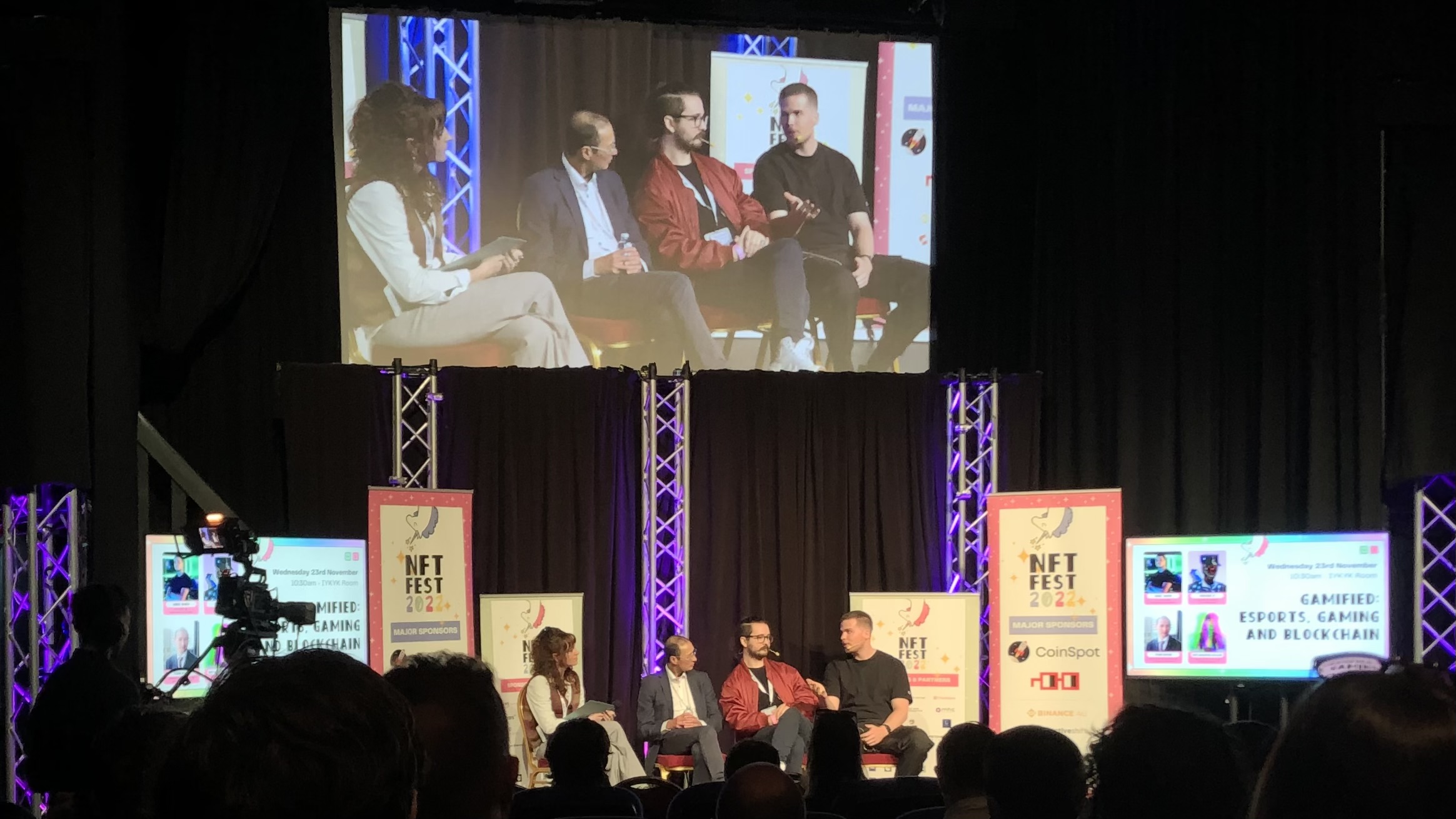‘Pay to win is the devil and play to earn shouldn’t be the focus’: BIG Esports founder Chris Smith at NFT Fest

Last week’s NFT Fest 2022 delivered several great panel discussions, one of them featuring influential Aussie gaming identity Chris Smith of BIG Esports. Coinhead caught up with him at the event for a quick chat.
(Image taken at NFT Fest 2022. From left: The Chainsaw’s Samantha Howard, Global Australia’s Stan Roche, The Metakey’s Michael P and BIG Esports’ Chris Smith.)
Hi Chris, on your NFT Fest panel you suggested the gaming format known as “pay to win” is the devil. Why is that?
Yeah, I often say that about pay to win. There are some markets where it works. But for starters, I’m a Western gamer and I enjoy esports, so it doesn’t really work with those combinations.
The reason for that is paying to have an advantage doesn’t make for a fair field. Imagine if you had pay to win in AFL, and you could only have 12 people on the field unless you paid extra money… it’s just not a fair system for everyone.
You also seemed to agree with your fellow panellist Michael P [from The Metakey] when he said the crypto-focused, play-to-earn concept “is poison”. If that’s the case, what do you think the blockchain gaming focus should be about? Play AND earn?
I don’t mind the term play and earn. But when it comes to both play to earn and play and earn… that’s just a potentially side, additional aspect that I really think shouldn’t be the focus of games.
Even the sales of owned assets shouldn’t be a main focus, I don’t think. I mean, one of our designers is doing an infographic on the top CSGO skins sales of all time – certain knives, for example, can fetch thousands of dollars. There’s even been an AK47 skin on sale for $400,000 with a bunch of offers on it. But it’s not the reason you play the game.
The focus should be good gameplay, and anything else you might potentially benefit from should just be an extra thing on the side.
Do you expect digital assets ownership will creep in gradually across most gaming titles?
Yeah, possibly… but I think it’ll just be seen as add-ons by the majority of the gaming world. Like I said, these sorts of things are definitely not the be all and end all for why someone plays games.
‘It’s really hard to make a good game’
What’s your take on the idea that more and more major traditional gaming studios and developers are coming across to Web3 to build games? I’ve spoken to some who are, but is that your impression?
There are those who are absolutely doing that and I think there’s definitely merit in what some of them are doing.
But there was a really good Twitter thread recently about how most Web3 games simply haven’t raised enough money at this stage. And I’d agree with that. How many people made Call of Duty? Maybe 300 to 400?
Think about how much money it takes to pay that many salaries, plus the marketing budget for Call of Duty… Most Web3 games are not even going to get close, so that’s why they need to figure out a different way to do things. Perhaps making money on the mints, for example, on top of investor money.
The thing is, though, it’s really hard to make a good game. And I think that’s what people don’t understand. People want to crap on EA and others… whatever… but it’s really hard to make a good Battlefield, a good Call of Duty.
Does mainstream gaming need to come across to make Web3 gaming successful? Or do you think Web3 gaming can be a successful independent niche of its own?
Yeah, it could be an independent niche. My understanding is that FPS [first-person shooter] is the most popular game genre of them all, but there can be niches, and niches within niches that are highly successful, too. Niche anime games, niche truck-driving simulators, farming simulators.
I think it’s up to something within Web2 to add in some concept from blockchain/Web3/crypto gaming to make people’s lives easier, and make a better experience for them. As of now, that hasn’t happened.
Web2.5 is where it’s at
Million-dollar question, then – any ideas what sort of Web3 concept would make Web2 gaming better?
It’s referred to as Web2.5 – adding something useful from Web3. So if Steam, for instance, added a different way to pay instead of buying Steam dollars. Some sort of crypto payment whereby you don’t have to go through PayPal, and you don’t have to pay transaction fees. Really, something that simple – people might enjoy that.
Essentially, I don’t think there needs to be a Web3 game as such. I believe in the idea of Web2 games using some sort of element from Web3 tech that makes the experience better.
People aren’t going to play a game that uses blockchain tech because it’s Web3, they’ll play it if it’s fun.
The Metakey’s content lead Michael P also spoke about blockchain tech enabling advanced and interoperable quest progression between different games. Do you think that’s a good Web3 gaming use case?
That was really cool, yeah. Whether you absolutely need blockchain tech to do a lot of these things, though, is another question. But I do think a good application is simply, smart contracts.
There are a lot of stories where esports tournaments and organisations haven’t paid teams the win or influencers for doing their agreed work etc. But that could be automated through a smart contract, because the money goes into escrow and then when X equals Y the money is automatically paid out or refunded depending on what happens. That would be cool.
You don’t need to go through accounting, you don’t need to have a proof and execution report, the proof and execution report is in the smart contract.
Maybe it could be skin sales, CSGO skin sales for example, that are smart contracts. That could lead to less scammy behaviour around those sales.
None of the contents of this article should be taken as financial advice. This interview was lightly edited for clarity.
UNLOCK INSIGHTS
Discover the untold stories of emerging ASX stocks.
Daily news and expert analysis, it's free to subscribe.
By proceeding, you confirm you understand that we handle personal information in accordance with our Privacy Policy.








